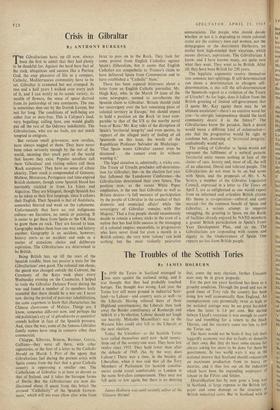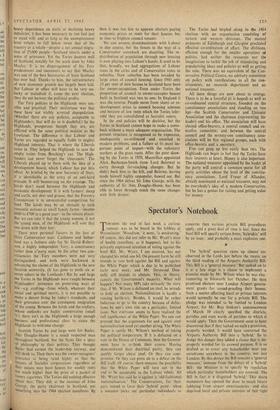The Troubles of the Scottish Tories
By 'JAMES HOLBURN
IN 1959 the Tories in Scotland managed to lose seats against the national swing, and it was thought that they had probably touched bottom. The thought was wrong. Last year the Tories lost still more ground in industrial Scot- land—to Labour—and country seats as well—to the Liberals. Having relieved them of three Highland constituencies, the Liberals then took away the Border constituency of Roxburgh and Selkirk at a by-election. Labour should not laugh too • heartily. Malcolm Macmillan's scat in the Western Isles could also fall to the Liberals at the next election.
Today the Unionists— as the Scottish Tories have called themselves until now--hold twenty- three out of the seventy-one seats. They have lost twelve since 1955. They hold fewer than after the debacle of 1945. (So, by the way, does Labour.) There was a time, in the heyday_ of Liberalism, when it was said that all the Tory Members of Parliament for Scottish constitu- encies could travel comfortably to London in the same first-class compartment. They may not fall quite so low again, but there is no denying
James Ilolburn was until recently editor of the 'Glasgow Herald.'
that, come the next election, further Unionist seats may be in grave jeopardy.
For the past ten years Scotland has been in 3 grouchy condition. Through'the good and not so good times of Tory rule the country has been doing less well economically than England. An unemployment rate perennially twice as high as the national average may be no great hardship when the latter is 1.6 per cent. But during Selwyn Lloyd's recession it was enough to cause fear and trembling for a return to the black Thirties, and the recovery came too late to ,bail the Tories out.
The Scots would not be Scots if they felt their laggardly economy was due to faults or demerits of their own. But they do haye some excuse for always asking for more to be done for them by government. In two world wars it was in the national interest that Scotland should concentrate on maximum production from its heavy in' dustries, and it thus lost out on the industries. which have been the expanding employers 01 labour in the Fifties and Sixties.
Diversification has by now gone a long %N:1) in Scotland, at large expense to the British tax' payer and some damage to the structure 01 British industrial costs. But in Scotland with it' heavy dependence on static or declining heavy industries, it has been necessary to run fast just to stand still; and as long as the unemployment level refus's to fall below twice that of the country as a whole—despite a net annual migra- tion of 25,000 people—Scotland smarts under a sense of grievance. Yet the Tories deserve well of Scotland, notably for the work done by John Maclay. It is no disparagement of his Tory predecessors and successors to say that Maclay was one of the best Secretaries of State Scotland has ever had. Thanks to him, the infrastructure of new economic growth has largely been laid. But Labour in office will have to be very un- lucky or maladroit if, come the next election, they do not harvest the political profits.
The Tory policies in the Highlands were sen- sible and practical. Their misfortune was that these have not visibly arrested depopulation. (Whether there are any policies, acceptable to Highlanders, that will do so is doubtful.) So the Highlands, prosperous. though they are, arc afflicted with the same political malaise as the Lowlands. The difference is that Labour and Tories are regarded as equally liable to neglect Highland interests. That is where the Liberals come in. They helped the Highlands to save the empty trains from Beeching's axe. The High- landers can never forget the 'clearances.' The Liberals played up to them with the idea of a development board, which Labour has put into effect. As briefed by the new Secretary of State, it is identifiable as the army of an anti-laird crusade. It will boomerang on the creatogs. The lairds don't stand between the Highlands and economic development. It is with farmers' sheep and cattle, not deer and grouse, that the Forestry Commission is in unsuccessful competition for land. The lairds may be an obstacle to such romantic notions as small family farms—income £600 to £700 in a good year----in the remote places. But we can take it that the young women, if not the young men, of the Highlands will vote that one down with their feet.
There were personal factors in the loss of three Conservative seats. Caithness and Suther- land was a fastness only for Sir David- Robert- son, a highly independent Tory, a constituency rather than eparty man. In the other two con- stituencies the Tory members were not very' distinguished, and both were backward in advancing the claims of the Highlands to the new Scottish university. (It has gone to jostle six or seven others in the Lowlands.) But by and large the Tories in the Highlands were caught between Highlanders' insistence on preserving ways of crofting—from which, whatever their
social and spiritual merits, it is not possible to make a decent living by today's standards, and their grievance over the consequent emigration of the young. Between the lairds and the crofters, whose outlooks are highly conservative (small 'c'), there isn't in the Highlands a large enough business and professional class to cause the Highlands to welcome change.
Scottish Tories by and large were for Butler.
Alec Douglas-Home is a much respected man throughout Scotland, but the Scots like a spice of philosophy to their politics. They thought Butler had earned the leadership anyway, and still think so. Then there was the owner-occupiers' grievance at being rated highly so that the tenants of Socialist corporations regardless of their means may have houses for weekly rents not much higher than the price of a packet of twenty cigarettes. The Tories did nothing effective about that. They did, at the instance of John George, the party chairman in Scotland, put 40mething into the 1964 election manifesto. By
then it was too late to appease electors paying economic prices or rents for their houses. but in time to frighten council tenants. , We can assume disenchantment with Labour in due course, but the fences in the way of a Conservative comeback are daunting. The re- distribution of population through new housing is now playing into Labour's hands. It used to be that, broadly, we had aggregations of Labour votes in the cities and of Conservative votes in suburbia. Now suburbia has been invaded by large areas of council housing. Since 1945 only 13 per cent of new houses in Scotland have been for owner-occupation. Even under Tories the proportion of council to owner-occupier houses built in Scotland was two to one. In England it was the reverse. People move from slums or re- development areas to council housing schemes and because of low rents which the Tories toler- ated they are consolidated as Socialist voters.
In the end policies will be decisive, but the Tories in Scotland cannot hope to make a come- back without a more adequate organisation. The present structure is recognised to be expensive, inadequately co-ordinated and unsuited to modern problems, and a failure at its most im- portant point of impact—with the voluntary workers at the grass roots. After the poor show- ing by the Tories in 1959, Macmillan appointed Alick Buchanan-Smith (now Lord Balerno) to carry through far-reaching changes. But he didn't back him to the hilt, and Balerno, having made himself highly unpopular, bowed out. But since the 1964 defeat Sir John George, with the authority of Sir 'Alec Douglas-Home, bas been able to force through much the same changes with little dissent. The Tories had hirpled along to the 1964 election with an organisation consisting of eastern and western divisions. The mutual jealousies of Edinburgh and Glasgow precluded effective co-ordination of effort. The divisions, efficient enough for the smaller operations 01 politics, had neither the resources nor the imagination to tackle the job of stimulating and popularising ideas and policies as well as getting the vote. There was no equivalent of the Con- servative Political Centre, no advisory committee on policy with ramifications to, all the con- stituencies, no research department and no national treasurer.
All these things are now about to emerge. There is to be a forceful (it is hoped) as well as co-ordinated central structure, founded on the constituency associations and standing on two legs—the Scottish Conservative and Unionist Association and the chairman (representing the leader) and his office. The association will have elected office-bearers, a central council and ex- ecutive committee; and between the central council and the seventy-one constituency asso- ciations will be five regional, groups, each with office-bearers and a secretary.
Five can gang up less easily than two. The Highlands can begin to feel that the Tories have their interests at heart. Money is also important. The national treasurer appointed by the leader of the party will control a common-purse for all party activities above the level of the constitu- ency associations. Lord Fraser of Allander, already nominated as national treasurer, may not be everybody's idea of a modern Conservative, but he has a genius for raising and getting value for money.































 Previous page
Previous page